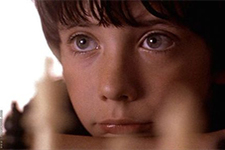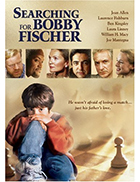Searching for Bobby Fischer
|  Bobby Fischer was a chess genius. He was so brilliant at chess that he was an international grandmaster by the time he was 15, and he left high school in order to become a professional player. Chess was his life: He studied and played it all day every day, and he dreamt about it at night. In 1972, he beat the Russian champion Boris Spassky to become the first American international champion since the title was established in 1886. Then, for his own reasons, he disappeared from the public eye. Although he is an ever-present symbolic figure in Searching for Bobby Fischer, Steven Zaillian’s film is not about the chess genius of the title. Fischer appears sporadically throughout the film in scratchy, black and white newsreels, and his name is constantly evoked as the standard to which all other chess players wish to compare themselves. When a brilliant young child player is first seen, there is murmuring in the crowd about how he resembles “a young Bobby Fischer.” Rather, Zaillian’s film is about a seven-year-old boy named Josh Waitzkin (Max Pomeranc), who is also a chess prodigy and could very well become the next Bobby Fischer. Josh has an astounding gift for visualizing chess moves, yet the film is ultimately about how and why he does not allow this gift to take over his life as Bobby Fischer did. In fact, as the film progresses, Fischer becomes a symbol of tragedy, rather than the gold standard of chess mastery. The film’s simple message is that no one thing should ever dominate anyone’s life, no matter how good he or she is at it. This is a hard lesson to learn, especially for a prodigy’s parents. Once Josh’s father, Fred (Joe Mantegna), discovers his son’s unique abilities, he encourages the boy to hone them. He pays a chess teacher, a one-time champion named Bruce Pandolfini (Ben Kingsley), a lot of money to coach Josh in the fine points of chess strategy. He travels all over the country so Josh can compete against other children in chess competitions. He tries to dissuade Josh from playing with hustlers in New York’s Washington Square Park, where the lessons of two-minute speed chess based on risky moves designed to intimidate one’s opponent run contrary to Bruce’s teachings about careful strategy and patience. One of the park players, a fast-talker named Vinnie (Laurence Fishburne) who plays chess with the verbal aplomb and in-your-face attitude of a boxer, says to Josh about Bruce’s coaching, “He’s not teaching you to win. He’s teaching you not to lose.” However, just as the film is not really about Bobby Fischer, it’s not really about chess, either. Chess is the heart and soul of the characters, but it could be any other special ability. The subject of the film is giftedness and what we should or should not do with our gifts. Do we have a responsibility to engage our gifts to their maximum potential? Is it a chess prodigy’s duty to be as good a chess player as he or she could possibly be, even if it is to the detriment of all other aspects of life? In Searching for Bobby Fischer, the answer is a resounding “no.” At several points in the film, Zaillian makes explicit reference to the damage that can be done to a human life when one activity dominates it. Fischer himself is only the most obvious example. There is another young player, a prodigy named Jonathan (Michael Nirenberg), whose teacher (Robert Stephens) proudly boasts that Jonathan’s parents have essentially given their boy over to him so that he can play chess all day, not even leaving time to attend school. That Jonathan is a robotic child, an eight-year-old who knows nothing and can enjoy nothing beyond a chess board, is fundamental to the film’s lesson about how lives can be destroyed when they are put in the service of one single thing. Zaillian also offers biting criticism of the parents of these child geniuses, showing how they must be locked downstairs away from the competitions lest they get in fistfights with each other while trying to live vicariously through the accomplishments of their offspring. Zaillian, who wrote the screenplay from the autobiographical book by Fred Waitzkin, has a great deal of admiration for his characters. While Fred temporarily slips into the parental mode of pushing Josh to excel to the detriment of other aspects of his life, he eventually sees the error of his ways. As played by Joe Mantegna, best know for roles as con men and gangsters, Fred is a decent man and a good father. He makes mistakes, but he is willing to see the error of his ways and make amends. His wife, Bonnie (Joan Allen), is even more understanding of their son. When Bruce becomes too verbally rough with Josh in an attempt to “toughen him up” for competition, she has no qualms about ordering the teacher out of her house. The film, then, is as much a story about familial strength as it is about giftedness. Yet, Josh is always the main character, and he is played with conviction and resourcefulness by Max Pomeranc, a young actor making his film debut. Zaillian has perhaps the most respect for his prodigious main character, and Josh is unique in the annals of cinematic giftedness. While most gifted characters in the movies (especially young ones) are nerdish (The Breakfast Club, 1985), socially withdrawn (Say Anything..., 1989), or emotionally disturbed (Shine, 1996), Max is a well-rounded young boy who cherishes baseball and friendships as much as he does (perhaps even more) than winning national chess championships. There is a particularly poignant moment when he realizes the expectations people have of him and how being the best is not always a good thing. “Maybe it’s better not to be the best,” he says quietly to his father. “Then it’s okay to lose.” That this seven-year-old boy comes to such a realization is testament to both his early maturity (perhaps forced on him because of his giftedness) and his humanity. Josh is a decent person, and it is this trait that defines him most, even more than his chess brilliance. It is for this reason that his mother declares that, if anyone tries to beat the decency out of him to make him a better chess player, she will take him away. Perhaps it was having the decency beat out of him that allowed Bobby Fischer to become the world chess champion in 1972. But, the film argues, it wasn’t worth it. THE DISC Widescreen: 1.78:1 Video: The new anamorphic transfer is, for the most part, very good. The overall picture is a bit soft, and there are several scenes that are too grainy. This is especially true of some shots of Ben Kingsley's character standing the park, which stand out as particularly grainy because the shots before and after it are not. Colors are nicely saturated and flesh tones look good, though, and despite the softness of the image, detail is still remarkably good. Audio: The Dolby Digital 5.1 surround track is surprisingly active for a film that is mostly dialogue and chess playing. There is a thunderstorm in the opening moments of the film that has strong directionality and creates an enveloping ambient environment. The chess games are also nicely rendered, with the constant thunking of the chess pieces being given an interesting sense of space and direction. Dialogue is always clear and audible, and James Horner's wonderful score is given its due, especially in the final sequence when the LFE channel is given some work to underscore the climax. Extras: Unfortunately, the disc has no supplements at all, not even a theatrical trailer. ©2000 James Kendrick |
Overall Rating: 


 (4)
(4)


